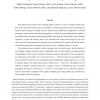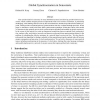57 search results - page 10 / 12 » On random walks in direction-aware network problems |
ICML
2010
IEEE
13 years 9 months ago
2010
IEEE
Markov logic networks (MLNs) use firstorder formulas to define features of Markov networks. Current MLN structure learners can only learn short clauses (4-5 literals) due to extre...
ICDCS
2006
IEEE
14 years 2 months ago
2006
IEEE
Distributed hash table (DHT) networks based on consistent hashing functions have an inherent load balancing problem. The problem becomes more severe due to the heterogeneity of ne...
CORR
2010
Springer
13 years 8 months ago
2010
Springer
Non-adaptive group testing involves grouping arbitrary subsets of n items into different pools. Each pool is then tested and defective items are identified. A fundamental question...
LATIN
2004
Springer
14 years 1 months ago
2004
Springer
Time synchronization is necessary in many distributed systems, but achieving synchronization in sensornets, which combine stringent precision requirements with severe resource con...
IMC
2006
ACM
14 years 2 months ago
2006
ACM
This paper addresses the difficult problem of selecting representative samples of peer properties (e.g., degree, link bandwidth, number of files shared) in unstructured peer-to-p...


